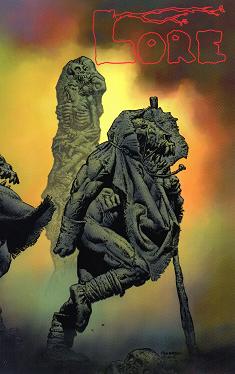 Lore, Vol. 2, No. 1, April 2012
Lore, Vol. 2, No. 1, April 2012 “Fairy Gold” by Peadar Ó Guilín
“Picking Roses For Chateelet” by Garrett Ashley
“Wait” by Kevin Wallis
“Splash” by Don Webb, Richard Lupoff, Scott Cupp, Michael Kurland, Michael Mallory,
“Toll and Trouble” by David A. Hill
“Lonely, Lonely” by Daniel P. Swenson
“She Wanted to Go into the Trees” by Patricia Russo
“The Spacetime Subway Station” by Clinton Lawrence
“The Deposition of Leodiel Fand” from Brian McNaughton
Reviewed by Chuck Rothman
Lore was an award-winning anthology of fantasy, horror and science fiction starting back in 1995. Like many small press magazines, it suffered and went on hiatus for over a decade, but it has now emerged with nine new stories.
“Fairy Gold” by Peadar Ó Guilín starts things out strongly. It’s set where it’s discovered that fairies have always existed, but in a parallel plane to Earth, with only a few crossovers at inaccessible points. Regan is a self-described “charming rogue” who inveigles his way into an expedition to meet the fairies, and despite warnings, finds a way into their world. What follows is his discovery of their true nature, and of the difficulty of escape. The story is filled with wonderful weirdness, but it’s all there for a reason and an ending that’s surprising and logical. Definitely a highlight in any magazine.
A pair of alien races are observing captured humans in “Picking Roses For Chateelet” and two, from different races, are affected by the sight, as well as by Earth foods and customs. I found Garrett Ashley‘s story choppy and difficult to follow and never really got a clear idea about what was going on.
In “Wait,” we meet Miller, the host at a national park, whose life has been shattered by the loss of his daughter to a mysterious monster in the shadows. He is looking for revenge, trying to confront the monster. Kevin Wallis creates a strong main character and shows us his attempt to do what he needs to do.
“Splash,” a group effort by Don Webb, Richard Lupoff, Scott Cupp, Michael Kurland, Michael Mallory, Paul Di Filippo, and Jim Kelly probably sets some sort of record for the ratio of words in the title to the words in the authors’ names. It’s set in the far future, where people have undergone modifications, both mechanical and alien, that has removed them from their human background. Radiant is one of these combinations, and runs into T’eela while vacationing, a damsel in distress. The rest is a roller-coaster of changes and strange concepts that manages to cohere into an entertaining read. It tries too hard in places to be wild and crazy, but overall is a nice story.
David A. Hill follows with “Toll and Trouble,” a story about Idain, a man living in a mysterious tower on the edge of the galaxy. He is visited by the demon Nestor, an old friend with a warning. The strength of this story is its baroque atmosphere and the interplay between the two characters, as well as Idain’s solution to the problem at hand.
“Lonely, Lonely” is about a planet whose inhabitants are all mentally linked, and what happens when their planet become a battleground by other forces. This sort of mental interplay is difficult to pull off, but Daniel P. Swenson comes up with a strongly plotted story about sacrifice and victory.
Patricia Russo creates a whole new underclass in “She Wanted to Go into the Trees”: The Sorry, a group of children whose very presence give other people a visceral disgust. The narrator is one of the group, able to avoid being killed as a child and old enough to become invisible as people avoid him. He runs into another of his kind, who promptly vanishes as he’s watching her, leading to a possibility of actual escape. I liked the concept and the character is filled with life, making this an excellent story
“The Spacetime Subway Station” is about a novel called The Spacetime Subway, written by Xavier’s robot friend Harvey G. The book is filled with weirdness that begins to interact with reality. The result is a breezy tale where things get more and more complicated. Clinton Lawrence managed to keep the concept grounded enough for the story to work.
The final offering is something of an anomaly, the first chapters of a novel by Brian McNaughton that was sent to the magazine shortly before McNaughton’s death in 2004 and finally seeing print. “The Deposition of Leodiel Fand” is set in his world of Seelura. I’m not familiar with McNaughton’s work, but it’s not necessary to enjoy the baroque sensibility of the people in that world. McNaughton creates some fine, mysterious characters as we hear Fand give his story. Since this is only part of a full novel, the story is incomplete, of course, and the plot has no chance to go very far. But the descriptions are fascinating to read and leaves you wishing the book had been completed.
Lore seems to favor stories with a poetic sensibility and strange worlds. There is plenty of weirdness to go around — and that’s a good thing.